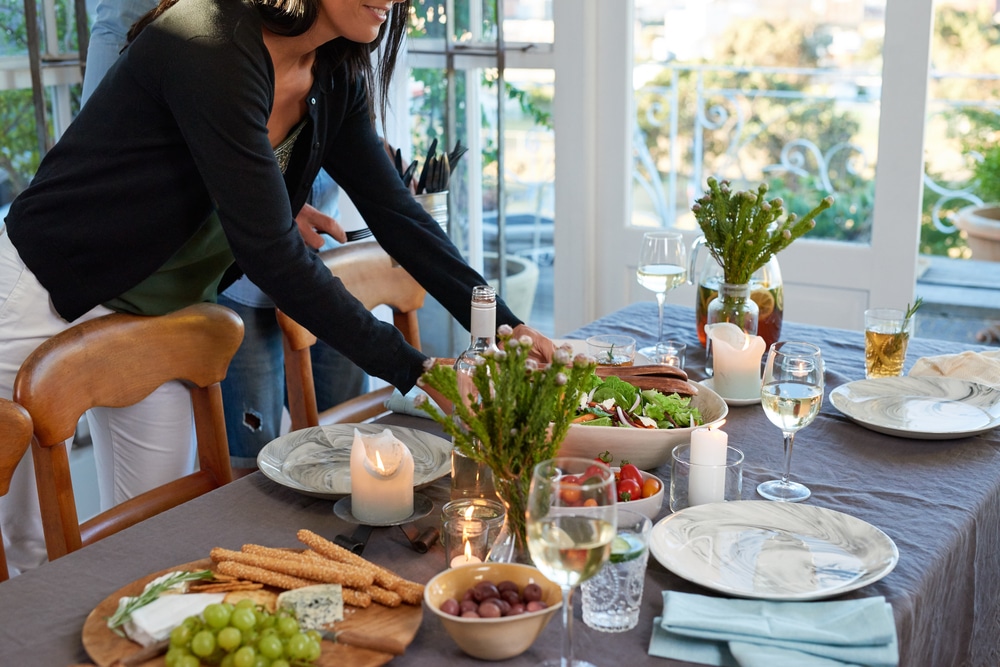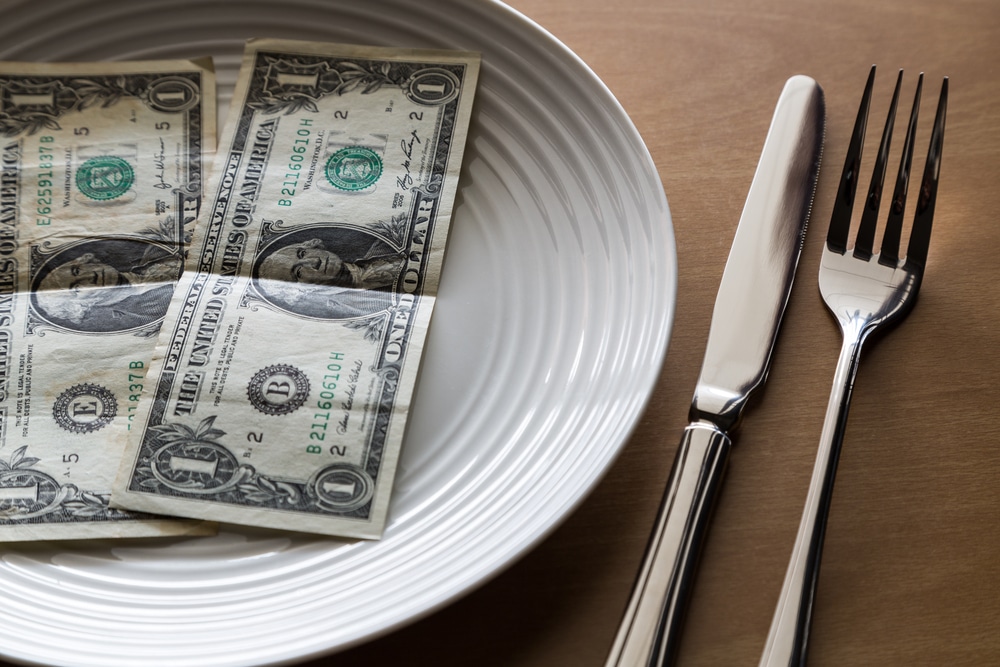Jasmine Birtles
Your money-making expert. Financial journalist, TV and radio personality.

Are you a foodie looking for a way to make a bit of extra cash on the side? Do you like meeting new people?
Well, the good news is there are many ways to turn your favourite hobby into a thriving business! One of the most exciting to pop up onto our radar recently, is to start a supper club of your own.
With their roots in the cabaret culture of the 1930s and ’40s, supper clubs are experiencing a revival as affordable alternatives to fancy restaurants and opportunities for diners to connect more authentically.
Read on for the MoneyMagpie guide to starting your own supper club from home.

Basically, a supper club – also know as an underground- or secret restaurant – is an eatery that you set up in your home.
You cook for as many guests as arrive and, traditionally, they leave you a ‘suggested donation’ to cover your costs and – maybe – make a bit of money. It’s a bit like Come Dine with Me on a larger scale, but without the film crew or sarcastic voiceover.
If you haven’t come across them before, there’s a clue in the name – they’re ‘secret’ and ‘underground’.
This is partly because supper clubs started off as a cheap way to dine out in the recession, but also because there are a number of rules and technicalities around commercial food preparation in a domestic kitchen, which supper clubs help you bypass.

The rules are – in short – rather complicated, all hinging on how long you’re running your supper club for and whether it’s casual or formal.
The law says that you don’t need to register as a ‘food premises’ if you run your business for less than five days in five consecutive weeks.
So, if you throw four supper club evenings over a period of two months, you don’t need to register with your local council.
If, however, you are hosting two supper club nights a week you should get in touch with your local council to ask for a food premises registration form.
Registering your kitchen is free so there’s no reason to not do it!
Should you have to register, you’ll need to fill in a short form giving the following details:
Some people don’t register their food business because they don’t know they have to, they think they can ‘do it later’ or actively decide that registering would spoil the underground, ‘edgy’ feel of the restaurant in their living room.
Some secret supper club restaurateurs get around the problem by telling guests to burst into a rendition of ‘Happy Birthday’ should they receive an unexpected visit from food safety officers.
While this definitely evokes the excitement of a 1920s speakeasy, here at MoneyMagpie we advise you to rather register if you are required to.
If in doubt, always check. Better safe than sorry!
Whether you need to register your supper club or not, visit the Food Standards Agency website for useful tips and information. They’ve got links to different Food Safety Acts as well as a downloadable guide to starting up a food business.
Find out how to make money baking cakes here

Up until now, the supper club business has been, well, secretive. And in many cases it still remains this way.
Individual front room restaurateurs typically publicise their undertakings through personal websites, social media sites -like Facebook and Twitter – and, of course, word-of-mouth. They normally take bookings over over email and payment (or ‘donations’) can either be made on the night or through websites using a secure system.
If you like organising your own business from start to finish, this is still a perfectly good method of setting up a supper club.
However, if you’re feeling a little unsure about all the admin related to dedicated websites, social media presences and payment systems, you may want to test the waters by using a ‘food sharing’ site to start off with:
Here are a few popular options:

It really depends.
Established secret supper clubs can charge between £30 and £50 a head, while well-known chefs could charge even more.
A good example of this is chef Nuno Mendez’s The Loft Project. Between June 2009 and October 2011, Mendez opened his East London apartment to diners, charging £100 per head for a 12 course tasting menu.
Generally speaking, however, you’ll have to take the following into account:
So, making money from your supper club depends largely on what you make of it and how businesslike you are.
On a small scale, it’s unlikely to make you a fortune but could be a good way of meeting people while making a little extra cash. If you’re more dedicated however, you could be onto a good earner.
Find out how you can cash in on catering here

For further inspiration, we popped a few questions off to Jules Thomas from The Secret Supper Society in north Oxfordshire about her experiences of starting and running her own supper club.
This is what she had to say:
I would suggest starting with friends and then it’s all word of mouth a social media from there.
Cook in the style you are most comfortable with and remember front-of-house is just as important as the food. Guests come for a new experience and may be nervous, so it’s up to us to help relax them.


What about Public Liability Insurance? Isn’t that essential in case you inadvertently cause harm?
Hi thank you for this. I have been planning on starting a supper club but been so skeptical and agitated on how it is going to be but reading this is giving a lot of hope to start. it is going to be an introduction into African cuisine as we have none where i live and it will be nice to get the foodies along with my culture food. i hope it is welcome well.
I find it cool that you suggested that a person who likes cooking can set up a supper club in their own home so that they can earn money on the side. Aside from that, one can also consider investing in an online ordering system when putting up this kind of business. Doing this will help a business owner prepare the ingredients and the dish in advance in order to have free time to keep the restaurant clean and organized.
Great tips for starting a supper club.
I am setting up a supper club in Exmoor, Devon. I ran a pub for 16 years with my husband and I was the chef. I now live with my son (my husband died last year), if I register the business will I have to pay business rates etc and then would that open a whole can of worms i.e. change of use blah, blah, blah. Really need some advice, many thanks.
This is not true. There is no law to exempt supperclubs from registering as food businesses, where did you find this? It used to be the case but law changed 2006. Any supperclubs not registered are operating illegally.
My wife and I live near Bodmin and are keen to give this a go, my wife is an excellent cook and we have some catering experience having retired after twenty years running our own small hotel/guesthouse. How do we publicise a supper club, are there any sites we can check out/ link with?
Cheers, Jeremy.
I run a small B&B in Falmouth and last year ran a few supper clubs. I’m not a chef, but I love cooking and my friends and family enjoy my food. This is why I was keen to give the supper club idea a go. It’s absolutely terrifying at first, but at the end of the evening when people make such kind comments about your food it’s really worth while. I’m about to set out a few menu’s for the coming few months while the B&B is quieter so hope to run a few more. I would love it if… Read more »
We’re so pleased you’ve given this a go, and it’s great to hear of your success with it. The Moneymagpies think this is such a great idea, in fact we’re thinking of running our own from Magpie HQ!
Hi I think this is a great idea 🙂
I am in Redruth, but am able to travel all over the county.
Let me know if you are planning anymore Supperclubs 🙂
Thanks
Claire
Hummm. Interesting.
I’ve been vaguely thinking of doing something like this – on a much smaller scale – as a fund-raiser for a local club and for a charity.
It has given me some ideas, and “Food for Thought” about what might be involved.